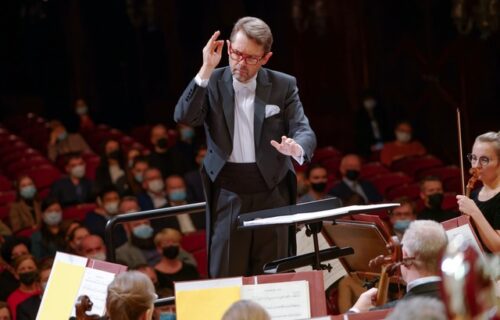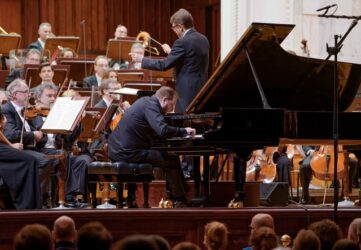 Poland Penderecki, Grieg, Kanczeli: Lukáš Vondráček (piano), Warsaw National Philharmonic Orchestra / Andrzej Boreyko (conductor). Warsaw Philharmonic Concert Hall, Warsaw, 28.11.2021. (RP)
Poland Penderecki, Grieg, Kanczeli: Lukáš Vondráček (piano), Warsaw National Philharmonic Orchestra / Andrzej Boreyko (conductor). Warsaw Philharmonic Concert Hall, Warsaw, 28.11.2021. (RP)

Penderecki – Symphony No.2 ‘Christmas Symphony’
Grieg – Piano Concerto in A minor, Op.16
Gija Kanczeli – ‘The Morning Prayers’ (Life without Christmas)
The Warsaw National Philharmonic Orchestra is celebrating the 120th anniversary of its founding. The orchestra flourished for almost 40 years, until the Second World War when it lost half of its members and the hall in which it performed was destroyed. Competed in 1901, the former Warsaw Philharmonic was modeled after the Paris Opera. The orchestra resumed performing in 1947, but would wait until 1955 to have a new home built in the socialist-realism style, which held sway in the Communist Bloc from the 1920s until the 1960s.
The grand public spaces of the Philharmonic Concert Hall are of white marble illuminated by crystal chandeliers. With 1,072 seats, the hall itself is dominated by the massive wooden organ case, which was built in 2001 by the German firm of Schucke. Two pluses of the hall are its spacious seats and excellent acoustics. The latter enhanced the extremes of mood and volume in this fascinating concert conducted by Andrzej Boreyko, who is now in his third season as the Music and Artistic Director of the Warsaw Philharmonic.
Composer and conductor Krzysztof Penderecki died on 29 March 2020 at the age of 86. He had been hailed for decades as Poland’s preeminent composer, but his influence ranged far beyond the world of classical music. His music showed up in the soundtracks of Hollywood films and influenced rock musicians: Jimmy Page, the founder and guitarist of Led Zeppelin, was just one who acknowledge the debt he owed to the Polish composer.
Although Penderecki never called it that, his Second Symphony, which quotes ‘Silent Night’, is known as the ‘Christmas Symphony’. There is another connection to the holiday: Penderecki began work on the symphony on Christmas Eve 1979. By that time, he had turned away from the avant-garde style that had brought him international fame. There were political pressures to conform but, more importantly, Penderecki had reached an artistic impasse with experimentation.
The symphony is in one movement and in line with the classical-romantic tradition. Except for the three brief snatches of ‘Silent Night’, there is nothing that hints even remotely of Christmas. There are moments of beauty here, especially the horn solos and the triumphant brass fanfares, but the harrowing marches and overall dark, brooding mood reflect a Poland seething with discontent that would lead to nationwide strikes and the founding of the trade union Solidarity in August 1980.
From the opening measures, in which the lower strings accompanied by the timpani play a somber melody, Boreyko slowly built momentum and tension almost to the breaking point. The march which appears midway was terrifying in intensity, with the incessant beat of the drum echoing and the violent slashes of sound reverberating through the hall. More than anything else, the symphony brought to mind Richard Strauss’s Elektra; a theme appeared throughout that evoked Elektra’s cry of ‘Agamemnon’. Boreyko set each repetition of Penderecki’s equally chilling theme in such a way that the connection was impossible to miss, at least for this critic.

The performance of Grieg’s Piano Concerto was no less exhilarating but without the terror: joy was the prevailing emotion. Lukáš Vondráček is a pianist in the grand style who can dazzle with his impeccable technique, amaze with the richness and depth of his sound and enchant with his delicacy and finesse in softer passages. The entrance of the piano in the second movement was as soft and shimmering as one can imagine.
Boreyko and the orchestra responded in kind. Of special note was the stately and lyrical playing from the horns throughout. For an encore, the Czech pianist eschewed drama for the pure beauty and elegance of Chopin’s Nocturne in E-flat major.
The final work on the program was ‘Morning Prayers’ from Life without Christmas by Georgian composer Gija Kanczeli (1935-2019). Like Penderecki, Kanczeli came of age when war raged across Europe, and spent much of his adult life in a society in which there was little room for religion or God. For most of the twentieth century, Christmas was largely erased from the calendar under the Soviet Union’s anti-religious policies.
In Life without Christmas, Kanczeli does not celebrate Christmas. Rather, he explores the lack of one of the most important events of the year for a great part of humanity, which people in the former USSR could not experience. Although not religious himself, Kanczeli embraced Christmas as a symbol of universal spirituality, which struggles to find a place in a world increasingly stripped of beauty and timelessness.
Life without Christmas is divided into four prayers, of which the first, ‘Morning Prayer’, was performed here. It is scored for strings, alto flute, bass guitar, piano and tape on which a boy’s voice is heard chanting a fragment from Psalm 130: ‘From the depths I cry to You, Lord, in which the oppressed man calls for help coming from on high’. The boy’s voice returns at the end of the work.
Kanczeli employed exotic sounds including prepared piano and the screech of the piccolo. At times the sounds that emerged from the piano were almost playful. The flute solos that appear throughout seemed to emerge from the stillness of the night. In spite of the complex textures, Boreyko and the players achieved an overall transparency that heightened the mysterious nature of the piece.
As the work drew to a close, the house suddenly went dark. and Boreyko moved to the piano (answering the question of why it had not been removed from center stage after the Grieg) to play the final measures. Just one more surprise in this remarkable concert.
Rick Perdian
